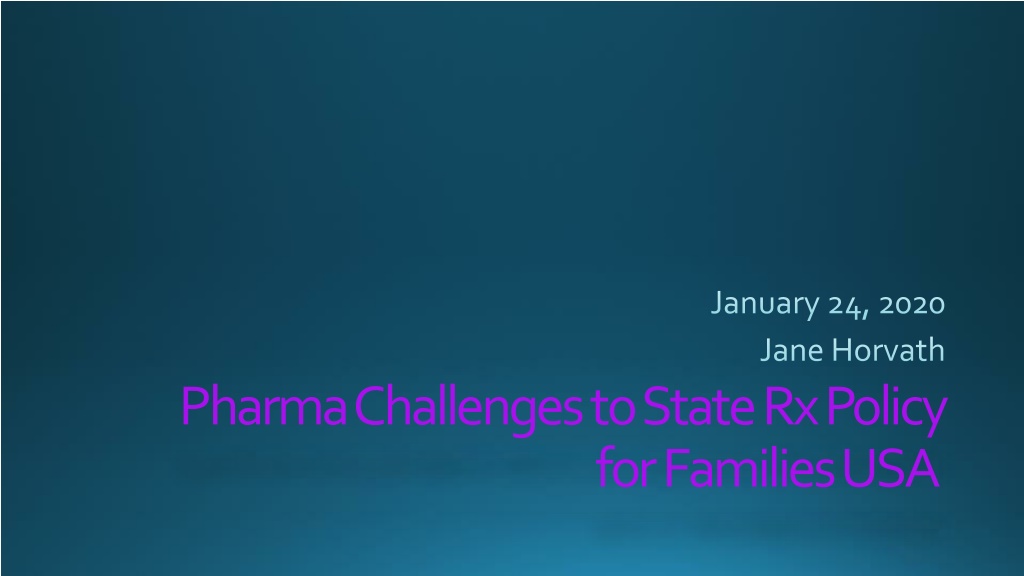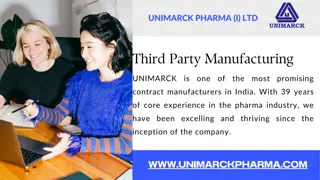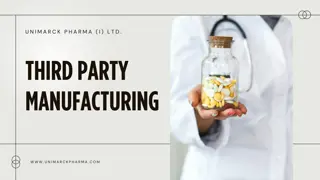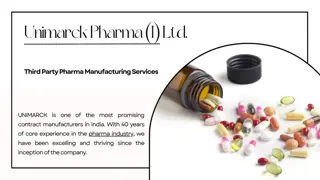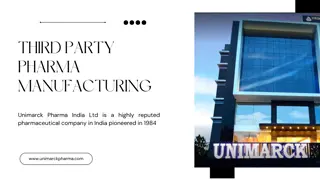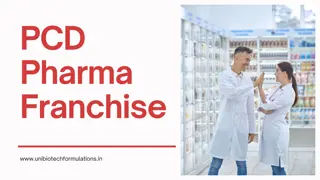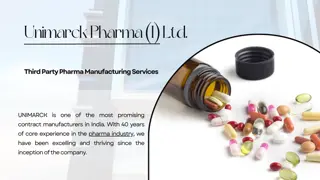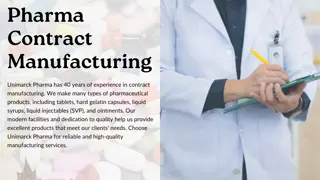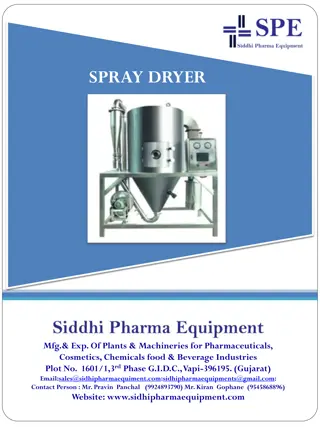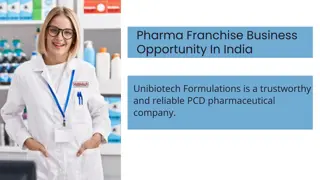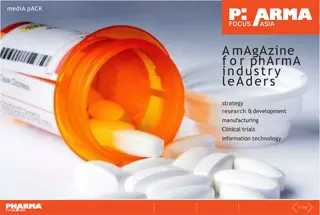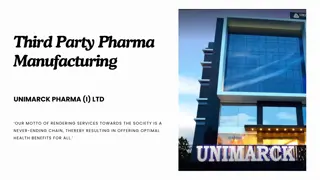Pharma Challenges and Legal Implications in State Rx Policy
Pharma companies face challenges with drug pricing, rebates, and threats to leave states. Legal implications include lawsuits, state laws on drug sales, and potential retaliation towards price control. Understanding these issues is crucial for policy and decision-making in the pharmaceutical sector.
Download Presentation

Please find below an Image/Link to download the presentation.
The content on the website is provided AS IS for your information and personal use only. It may not be sold, licensed, or shared on other websites without obtaining consent from the author. Download presentation by click this link. If you encounter any issues during the download, it is possible that the publisher has removed the file from their server.
E N D
Presentation Transcript
January 24, 2020 Jane Horvath Pharma Challenges to State Rx Policy for Families USA
Pharma Challenges Threats 2
Pharma: drug prices are the fault of others Pharma blames PBMs and insurers, and the federal 340B program Pharma created the rebate system that they hate now Rebates compensate for market prices that pharma knows are too high Insurers get rebates to reduce impact of Rx costs on premiums Giving rebates to patients can drive up premiums Rebates can be given to pharmacist, which would not drive up premiums Pharma does not really want rebates to go to point of service then the actual cost of the drug would be public anathema to pharma. The PBM rebates are so large, perhaps because rebates to PBMs can be exempt from Medicaid best price Horvath Health Policy, Innovations in Health Care Financing 3
Pharma: We Will Take Our Jobs and Leave Your State NIH funding by state Compare to industry R&D dollars state by state Clinical Trials by State and funder Sort query by industry and non-industry funding Clinical Trials US v ex US Shows that 58% of registered trials occur outside US and 36% in the US In MD we found that NIH was responsible for much more R&D funding than pharma Be alert for PhRMA publication: Pharma in [your state name] Horvath Health Policy, Innovations in Health Care Financing 4
Pharma: We Will Not Sell Drugs in Your State Highly unlikely: a sale is a sale. Germany, France, Great Britain, Japan, Canada, China .. Manufacturers provide additional discounts to Veterans Administration and to 340B program beyond federally required price concessions. A sale is a sale. Leaving a state would cede the market to a competitor product. Look to your state business laws and consumer protection laws to fend off retaliation Illegal to advertise without intent to sell Illegal to withhold sales in order to drive up price Illegal to fail to renew contracts without cause (i.e. retaliation) Governor has price control powers in emergency [drug shortage] situation State may need new state law provision Horvath Health Policy, Innovations in Health Care Financing 5
Lawsuits Pharma Challenges
Basics of Pharma Lawsuits Rule: Must sue a state in state court unless violations of Constitutional rights are alleged Rule: A violation of a federal law (such as patent protections) triggers a violation of the Supremacy Clause of the Constitution State law cannot contradict federal law PhRMA and BIO lawsuits sue on multiple constitutional violations in any one challenge State and local government purchasers and payers can do things about price directly without a legal challenge because state is a market participant in this instance But there is not much they can do to get at manufacturer prices Horvath Health Policy, Innovations in Health Care Financing 7
Dormant Commerce Clause Feds regulate interstate commerce States regulate intrastate commerce What happens when regulated industry is regional, national, international? Made more sense when businesses were local Prices are national, costs are local State authority and responsibility to protect health and safety of residents Court decisions for DCC violation intimidate state policymakers AAM v Frosh. MD HB 631, anti-price gouging State policy cannot dictate out of state manufacturer prices PhRMA v WDC price controls State policy cannot dictate out of state manufacturer prices State policy cannot tie in-state prices to other prices out of state DC referenced-price. Capped Rx prices to the average of 5 EU countries DCC lawsuit in process in CA re SB17 and OR re HB4005 Horvath Health Policy, Innovations in Health Care Financing 8
Due Process and Free Speech Due Process Manufacturer allegations MD HB631 punished unconscionable price increases which is an unknown Court did not rule on this issue Free Speech Manufacturer allegations CA SB 17 requiring manufacturers to say if price increase results from drug improvement forces speech that the manufacturer would not choose to speak. If no improvement, implication that manufacturer price increase is not justified or wrong. CA lawsuit ongoing HHS rule to post Rx prices on TV ads violated manufacturer free speech rights Court did not rule on free speech but found HHS exceeded its authority Horvath Health Policy, Innovations in Health Care Financing 9
Trade Secrets States have trade secret protection laws, federal law since 2016 Legal Challenges NV law specifically exempted Rx company data from state trade secrets law CA data FOIA d by advocates for information on upcoming price increases. Industry sued to keep information confidential. OR enacted a 60-day price increase advance notice law (same a CA) Pharma claims even public information about a company is a trade secret Proposed states collect only public info which would become a trade secret once the state collected it. (true) Most of what pharma refuses to provide can be ascertained through publicly available sources, thus not a trade secret (a lot of effort required) Cost of JAMA ads, cost of TV prime time ads, and the # ads . R&D is in SEC 10-K if spending is relevant for investors Competitors are not clueless about what they each spend on operations because their operations are similar Competitors raise prices similar amounts once the first company announces its increase nothing secret after that among competitors Launch prices are predictable too, based on market price of competitors already in the market. Horvath Health Policy, Innovations in Health Care Financing 10
Patent Law Violations/Supremacy Clause PhRMA BIO v WDC Court discussed that price caps limited innovator s rights to unfettered profits DC law contrary to federal patent scheme created by congress No discussion in the trial of 340B program as very clear example of congressional intent to limit profits through direct price controls federal government not a 340B market participant Horvath Health Policy, Innovations in Health Care Financing 11
How Court Rulings Affect State Policy Price gouging legislation limited to generics and off-patent brands in response to earlier DC Circuit ruling on supremacy clause/patent law But then 4thcircuit found that limiting price gouging to generics was not fair .. Drug Affordability Boards limited to state/local government purchasers and payers (ME and MD) Limit PDAB to government payers immunizes the state from DCC lawsuit Government as market participant rather than regulator Such limitations undermine the intent and effectiveness of the PDAB and viability of upper payment limits Need a pathway from application to government payers to application statewide protect all residents We need some strong laws in different federal circuits to get stronger decisions that support state consumer protection authority. We have just one-off decisions in two circuits to which every state is responding. State Attorneys General need to be facile with federal healthcare policy, laws, rules andknow how the industry operates in order to maximize effectiveness Horvath Health Policy, Innovations in Health Care Financing 12
R&D Myth Busters Pharma Challenges
Lots of Room for Lower US Prices & continued R&D Pharma return on investment is $14:1 for cancer drugs (World Health Organization 2018) R&D of $7.2B for 10 cancer drugs, revenue of $67B JAMA 9/2017 US-based Rx companies earned 176% of their worldwide R&D budget from just the portion of US prices that are above the prices charged in other countries (Health Affairs Blog 3/2017) large pharmaceutical manufacturers could face an 11% profit reduction and still have a more effective return on capital compared to other industries; a 21% profit reduction would leave these manufacturers more competitive than 75% of other industries. (West Health, 11/2019) Horvath Health Policy, Innovations in Healthcare Financing Policy 14
Off Topic But Important Pharma Challenges
Importation briefly No constitutional basis for industry lawsuit against a state Need change in federal law: Allow importation from EU, Great Britain, Japan, Israel Allow state wholesale programs to import biologics (insulins, vaccines, anti-cancer products) if your state has an import law or a bill Get your governors or legislators to contact your congressional delegation US Senate Finance Drug Price legislation could move to the floor this Spring, vehicle for import amendments Senator Grassley (R-IA, Chair of Finance) supports drug importation (co-sponsor of import legislation) State importation programs will not get off the ground if supply limited to Canada once the big states participate (NY Governor announced recently, Florida has a law) Horvath Health Policy, Innovations in Health Care Financing 16
Thank You! Jane Horvath Horvath Health Policy, Innovations in Healthcare Financing Policy Linkedin.com/in/horvathhealthpolicy www.horvathhealthpolicy.com HorvathHealthPolicy@gmail.com 202/465-5836 17
